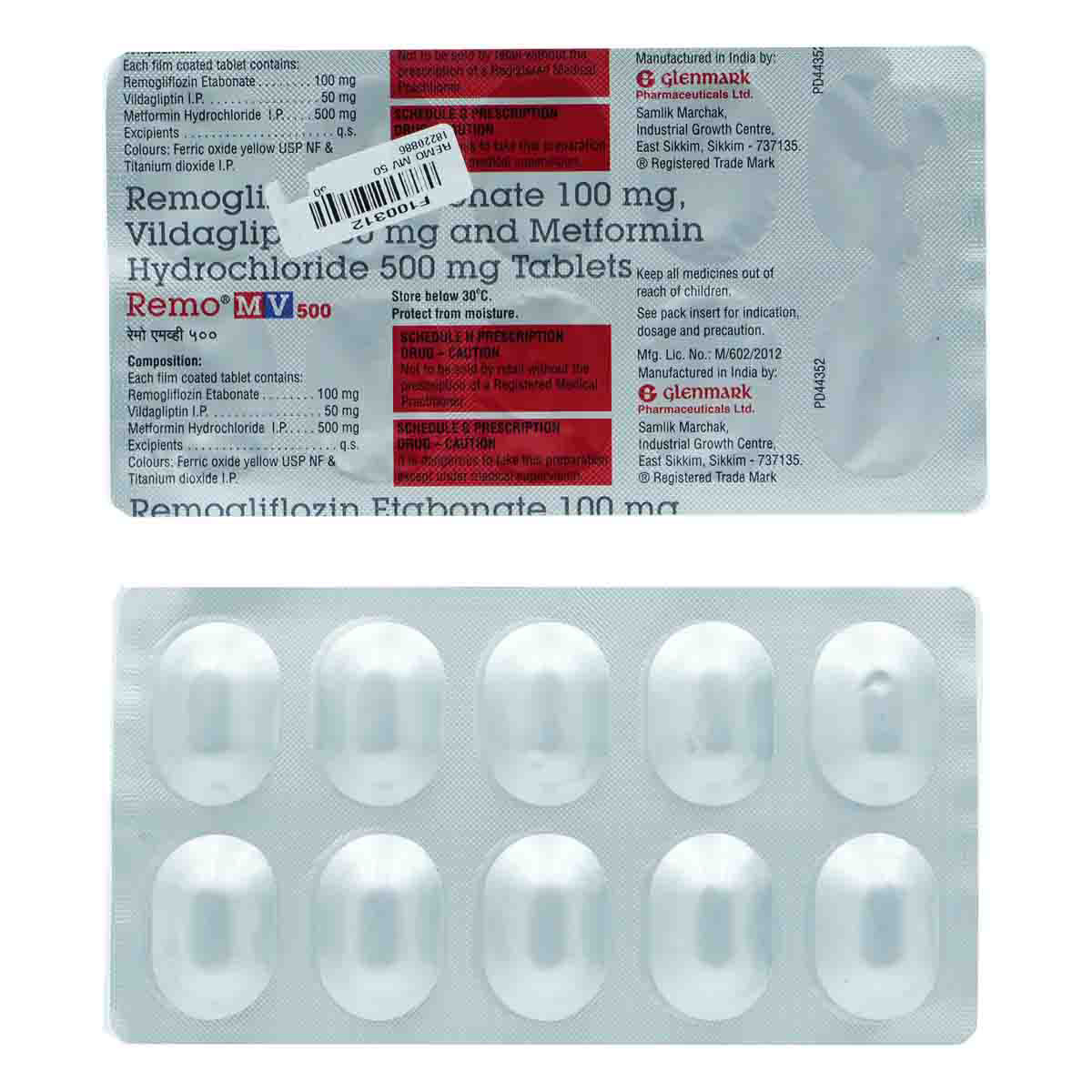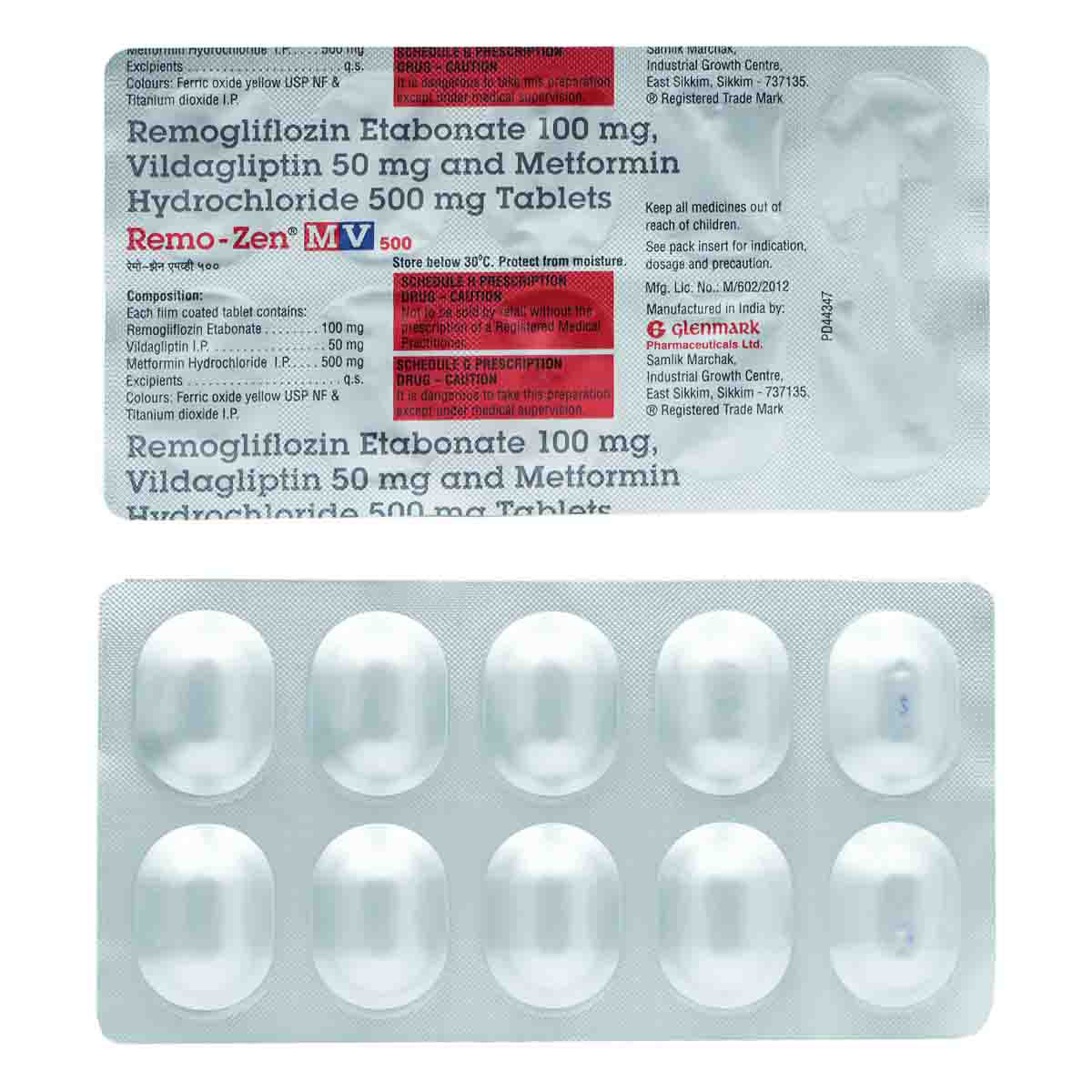Metformin+vildagliptin+remogliflozin
About Metformin+vildagliptin+remogliflozin
Metformin+vildagliptin+remogliflozin used to treat type-2 diabetes mellitus adjunct to diet and exercise. Type-2 diabetes mellitus is also known as non-insulin-dependent diabetes or adult-onset diabetes. It is a medical condition in which blood glucose levels are above normal due to insulin deficiency, insulin resistance, or both.
Metformin+vildagliptin+remogliflozin contains Remogliflozin, Vildagliptin and Metformin. Remogliflozin etabonate helps in removing excess sugar from the body via urine. Metformin works by reducing the sugar production by cells in the liver and delays sugar absorption from the intestines. Also, it increases the body’s sensitivity to insulin. Vildagliptin works by decreasing the hormones that raise blood glucose levels and increasing insulin release from the pancreas. Together, Metformin+vildagliptin+remogliflozin helps control blood sugar levels.
Metformin+vildagliptin+remogliflozin should be taken as advised by your doctor for a period prescribed for you, depending on your medical condition. This medicine may cause certain common side effects such as stomach upset, hypoglycaemia, nausea, and vomiting. Most of these side effects do not require medical attention and will resolve gradually over time. However, if you experience these side effects persistently, consult your doctor on priority.
Metformin+vildagliptin+remogliflozin should be avoided if you are allergic to any of the components in it. Consult your doctor if you are pregnant or breastfeeding. Avoid alcohol consumption while taking Metformin+vildagliptin+remogliflozin as it might cause unpleasant side effects. Inform your doctor about all the medicines you are taking and your health condition to rule out any unpleasant side effects/interactions. Metformin+vildagliptin+remogliflozin is not recommended for children below 12 years of age as safety and efficacy is not established.
Uses of Metformin+vildagliptin+remogliflozin
• Helps lower blood sugar levels: Metformin+vildagliptin+remogliflozin reduces excess glucose in the blood by multiple mechanisms.
• Removes excess sugar through urine: Due to the action of remogliflozin present in Metformin+vildagliptin+remogliflozin
• Reduces sugar production and absorption: Metformin+vildagliptin+remogliflozin lowers glucose made by the liver and slows its absorption from the gut.
• Enhances insulin action and release: Metformin+vildagliptin+remogliflozin increases insulin secretion and reduces hormones that raise blood sugar.
Medicinal Benefits
Metformin+vildagliptin+remogliflozin contains Remogliflozin, Vildagliptin and Metformin. Remogliflozin etabonate helps in removing excess sugar from the body via urine. Metformin works by reducing the sugar production by cells in the liver and delays sugar absorption from the intestines. Also, it increases the body’s sensitivity to insulin. Vildagliptin works by decreasing the hormones that raise blood glucose levels and increasing insulin release from the pancreas. Together, Metformin+vildagliptin+remogliflozin helps control blood sugar levels.
Directions for Use
Storage
Side Effects of Metformin+vildagliptin+remogliflozin
- Stomach upset
- Hypoglycaemia (low blood sugar levels)
- Nausea
- Vomiting
- Diarrhea
- Headache
Drug Warnings
Do not take Metformin+vildagliptin+remogliflozin if you are allergic to any of its components. Inform your doctor if you have heart problems, diabetic ketoacidosis, skin disorder, acute pancreatitis, low blood sugar levels, or kidney or liver problems. Consult your doctor if you are pregnant or breastfeeding. Metformin+vildagliptin+remogliflozin is not recommended for children as safety and effectiveness have not been established. Avoid alcohol consumption while taking Metformin+vildagliptin+remogliflozin as it might cause unpleasant side effects. Inform your doctor about all the medicines you are taking and your health condition to rule out any unpleasant side effects.
Drug Interactions
Drug-Drug Interactions: Metformin+vildagliptin+remogliflozin may interact with anti-diabetic (insulin glargine), diuretic (furosemide), hormone (levothyroxine) and corticosteroids.
Drug-Food Interactions: Avoid alcohol consumption.
Drug-Disease Interactions: Inform your doctor if you have diabetic ketoacidosis, dialysis, skin disorder, acute pancreatitis, or hypoglycaemia (low blood sugar levels).
Drug-Drug Interactions Checker List:
Safety Advice

Alcohol
unsafeAvoid consumption of alcohol during treatment with Metformin+vildagliptin+remogliflozin as it can lead to unpleasant side effects.

Pregnancy
unsafeIf you are pregnant or planning pregnancy, inform your doctor before starting treatment with Metformin+vildagliptin+remogliflozin. Your doctor may prescribe this medicine if the benefits outweigh the risks.

Breast Feeding
cautionLimited data available on the effect of Metformin+vildagliptin+remogliflozin on breastfeeding. Hence, if you are a nursing mother, inform your doctor before taking Metformin+vildagliptin+remogliflozin. Your doctor may prescribe this medicine if the benefits outweigh the risks.

Driving
cautionIt is not known if Metformin+vildagliptin+remogliflozin affects your ability to drive. Drive or operate machinery only if you are alert.

Liver
cautionIf you have a pre-existing or a history of liver disease, inform your doctor before taking Metformin+vildagliptin+remogliflozin. Your doctor may adjust the dose of this medicine or prescribe a suitable alternative based on your condition.

Kidney
cautionIf you have a pre-existing or a history of kidney disease, inform your doctor before taking Metformin+vildagliptin+remogliflozin. Your doctor may adjust the dose of this medicine or prescribe a suitable alternative based on your condition.

Children
unsafeMetformin+vildagliptin+remogliflozin is not recommended for use in children below 12 years of age as the safety and efficacy are not established.
Habit Forming
Diet & Lifestyle Advise
- Eat foods rich in healthy carbohydrates and fibre, fruits, whole grains, and vegetables.
- Try eating food at regular intervals. Do not skip meals. Also, try not to overeat.
- Follow a healthy diet and walk/exercise for at least 45 minutes.
- Maintain a healthy weight by exercising regularly.
- Rest properly, avoid stress by doing meditation or yoga.
Special Advise
- Regularly monitor blood glucose levels while taking Metformin+vildagliptin+remogliflozin.
- Try not to skip any doses and take Metformin+vildagliptin+remogliflozin for as long as your doctor has prescribed it for you.
- Always carry a sugary food such as candy or fruit juice and consume them if you experience hypoglycaemia.
- Consult a doctor if you notice sores or signs of infections.
Patients Concern
Disease/Condition Glossary
Type-2 diabetes mellitus: It is also known as non-insulin-dependent diabetes. It is a chronic or lifelong disease that keeps the body from utilizing insulin properly. Diabetes is a medical condition in which blood glucose levels are above normal. People with type 2 diabetes either do not produce enough insulin, or the insulin produced cannot perform its function in the body (insulin resistance). Middle-aged or older individuals are most likely to suffer from type 2 diabetes; hence it is also known as adult-onset diabetes. Type 2 diabetes symptoms include lack of energy, tiredness, frequent urination, excess thirst, dry mouth, blurry vision, constant hunger, weight loss, and itchy skin.
FAQs
Metformin+vildagliptin+remogliflozin is used to treat type-2 diabetes mellitus adjunct to diet and exercise.
Metformin+vildagliptin+remogliflozin contains Remogliflozin, Vildagliptin and Metformin. Remogliflozin helps in removing excess sugar from the body via urine. Vildagliptin works by decreasing the hormones that raise blood glucose levels and increasing insulin release from the pancreas. Metformin reduces sugar production by cells in the liver and delays sugar absorption from the intestines. Also, it increases the body’s sensitivity to insulin. Together, Metformin+vildagliptin+remogliflozin helps control blood sugar levels.
Hypoglycemia/low blood sugar levels could be the side effect of Metformin+vildagliptin+remogliflozin. Hypoglycemia generally occurs when Metformin+vildagliptin+remogliflozin is taken along with other antidiabetic medicines, without food or with alcohol. Consume sugary food such as candy or fruit juice if you experience hypoglycemic symptoms such as dizziness, cold sweats, anxiety, or tremor. Regularly monitor blood glucose levels while taking Metformin+vildagliptin+remogliflozin.
Low-fibre diets, high-fat diets, sugary diets, obesity, smoking, stress, lack of exercise, age, genetic factors, and certain medical conditions are the common causes of diabetes.
Metformin+vildagliptin+remogliflozin may cause dizziness. To minimize the risk, drink plenty of water, monitor your blood pressure and sugar levels, and rise slowly from sitting or lying down. If you experience dizziness, consult your doctor.
When taking Metformin+vildagliptin+remogliflozin, it is essential to be mindful of your diet to ensure the medication works effectively and to avoid potential side effects. Avoid excessive alcohol intake, limit high-sugar foods, be cautious with high-fat foods, and stay hydrated by drinking plenty of water. It is always best to follow your doctor's dietary recommendations and maintain a balanced diet to manage your diabetes effectively.
Metformin+vildagliptin+remogliflozin is generally considered safe when used as prescribed. However, like any medication, it can have side effects. To ensure safety, follow your doctor's instructions, disclose existing health conditions, and promptly report any severe or unusual side effects.
Do not stop taking Metformin+vildagliptin+remogliflozin without consulting your doctor. Stopping the medication abruptly can lead to an increase in blood sugar levels and put you at risk of serious complications. Always follow your doctor's advice regarding the use and discontinuation of any medication.
It is recommended that an individualized approach is essential when it comes to dietary choices, including protein intake. Factors such as cardiometabolic risk and renal function play a significant role in determining the appropriate dietary macronutrient composition for each individual. It is always best to consult with a healthcare provider or a registered dietitian who can assess your specific needs and create a personalized nutrition plan. They can take into account your medical history, current health status, and any other relevant factors to ensure you have a balanced and effective diet.
Artificial sweeteners can be a good alternative for people with diabetes but with some caveats. They are low in calories, don't raise blood sugar levels, and can help manage carbohydrate intake. However, some research suggests that artificial sweeteners can confuse the body's natural ability to regulate blood sugar, and overconsumption can lead to sweet cravings and weight gain. Natural sweeteners like stevia or monk fruit might be a better choice. Ultimately, moderation is key, and it's best to consult with a healthcare provider or registered dietitian for personalized advice.
Diabetes can cause kidney failure. Diabetic nephropathy, also known as diabetic kidney disease, is a serious complication of both type 1 and type 2 diabetes. It occurs when high blood sugar levels damage the blood vessels and other kidney cells over time. This damage impairs the kidneys' ability to filter waste and excess fluid from the body, leading to kidney failure. Managing diabetes and maintaining a healthy lifestyle can help prevent or delay the onset of diabetic nephropathy. Regular check-ups with your healthcare provider are essential to monitor kidney function.
Currently, there is no cure for diabetes. However, it is possible to manage the condition effectively and, in some cases, achieve remission (blood sugar levels are normal without medication, but the disease remains). For type 1 diabetes, which is an autoimmune condition, lifelong insulin therapy is required. For type 2 diabetes, lifestyle changes such as a healthy diet, regular exercise, and weight loss can help manage the condition and, in some cases, lead to remission. It is essential to work closely with your healthcare provider to develop a personalized plan for managing diabetes and to monitor your progress over time.




